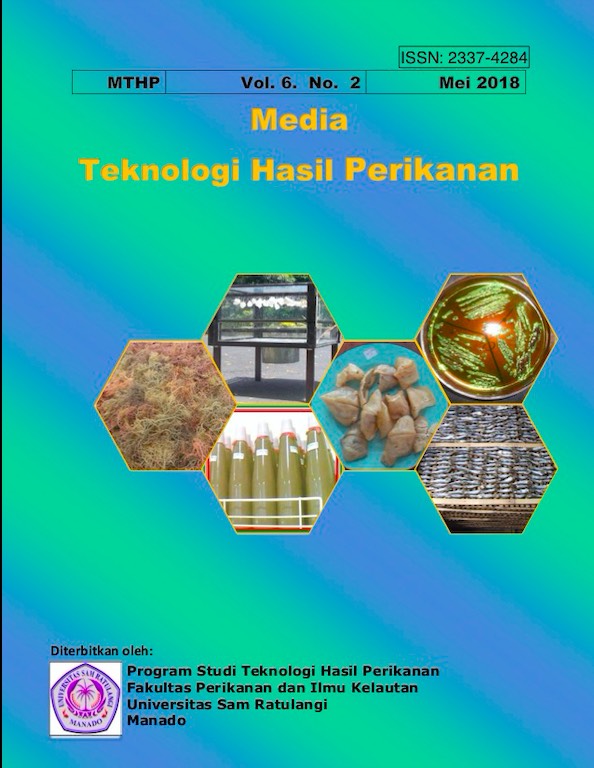TINGKAT KESUKAAN PANELIS TERHADAP PENYEDAP RASA ALAMI HASIL SAMPING PERIKANAN DENGAN EDIBLE COATING DARI KARAGENAN
DOI:
https://doi.org/10.35800/mthp.6.2.2018.19507Keywords:
edible coating, carrageenan, fish juiceAbstract
 Product of fish procecing industry called “juice water†contain a lot amino acid compound. The aim of this study was analyze sonsory characteristic of natural condiment made from†juice water†by product of fishery industry , coated with karagenan edible. The method of this study of natural condimenent coated karagenan coating where assessed by trained panelis using by sensory attributes (odor, colour apparance and taste).The result indicate potencial of natural condiment for seasoning development.This research aims to be able to produce natural flavor that made from raw material of liquid waste of stew and coating with edible coating of carrageenan. A natural flavor enhancer, as a food additive, needs to be done a hedonic organoleptic analysis to see the panelist's preference for natural flavorings. The results of a hedonic organoleptic test show that taste and odor are preferred over the texture and appearance of the natural flavorings.Downloads
Published
05/01/2018
How to Cite
Djohar, M. A., Timbowo, S. M., & Mentang, F. (2018). TINGKAT KESUKAAN PANELIS TERHADAP PENYEDAP RASA ALAMI HASIL SAMPING PERIKANAN DENGAN EDIBLE COATING DARI KARAGENAN. Media Teknologi Hasil Perikanan, 6(2), 37–41. https://doi.org/10.35800/mthp.6.2.2018.19507
Issue
Section
Articles
License
Authors who publish with this journal agree to the following terms:
- Authors retain copyright and grant the journal right of first publication with the work simultaneously licensed under a Creative Commons Attribution License that allows others to share the work with an acknowledgement of the work's authorship and initial publication in this journal.
- Authors are able to enter into separate, additional contractual arrangements for the non-exclusive distribution of the journal's published version of the work (e.g., post it to an institutional repository or publish it in a book), with an acknowledgement of its initial publication in this journal.
- Authors are permitted and encouraged to post their work online (e.g., in institutional repositories or on their website) prior to and during the submission process, as it can lead to productive exchanges, as well as earlier and greater citation of published work (See The Effect of Open Access).






